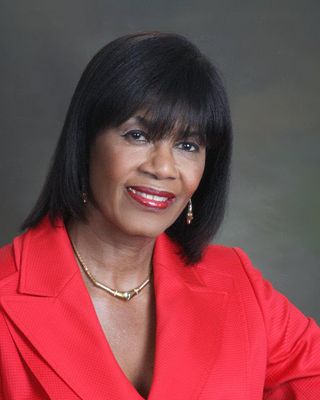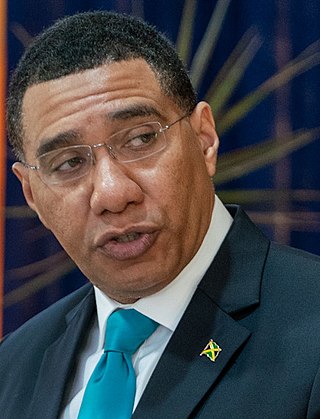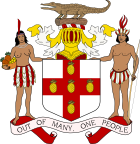
The Caribbean Island of Jamaica was initially inhabited in approximately 600 AD or 650 AD by the Redware people, often associated with redware pottery. By roughly 800 AD, a second wave of inhabitants occurred by the Arawak tribes, including the Tainos, prior to the arrival of Columbus in 1494. Early inhabitants of Jamaica named the land "Xaymaca", meaning "land of wood and water". The Spanish enslaved the Arawak, who were ravaged further by diseases that the Spanish brought with them. Early historians believe that by 1602, the Arawak-speaking Taino tribes were extinct. However, some of the Taino escaped into the forested mountains of the interior, where they mixed with runaway African slaves, and survived free from first Spanish, and then English, rule.

Michael Norman Manley was a Jamaican politician who served as the fourth prime minister of Jamaica from 1972 to 1980 and from 1989 to 1992. Manley championed a democratic socialist program, and has been described as a populist. He remains one of Jamaica's most popular prime ministers.

The People's National Party (PNP) is a social democratic political party in Jamaica, founded in 1938 by Norman Washington Manley who served as party president until his death in 1969. It holds 14 of the 63 seats in the House of Representatives, as 96 of the 227 local government divisions. The party is democratic socialist by constitution.

Percival Noel James Patterson,, popularly known as P.J. Patterson, is a Jamaican former politician who served as the sixth Prime Minister of Jamaica from 1992 to 2006. He served in office for 14 years, making him the longest-serving prime minister in Jamaica's history. He was the leader of the People's National Party from 1992 to 2006.

Keith Claudius Mitchell is a Grenadian politician who served as Prime Minister of Grenada from 1995 to 2008 and from 2013 to 2022. He is the longest-serving Prime Minister in Grenadian history, holding the office for more than 22 years. He was leader of the New National Party (NNP) from 1989 until 2024 and has been the Leader of the Opposition in the House of Representatives of Grenada from 2008 to 2013, and again since 2022.

The Jamaica Labour Party is one of the two major political parties in Jamaica, the other being the People's National Party (PNP). While its name might suggest that it is a social democratic party, the JLP is actually a conservative party.

Edward Philip George Seaga was a Jamaican politician and record producer. He was the fifth Prime Minister of Jamaica, from 1980 to 1989, and the leader of the Jamaica Labour Party from 1974 to 2005. He served as leader of the opposition from 1974 to 1980, and again from 1989 until January 2005.

Portia Lucretia Simpson-Miller is a Jamaican former politician. She served as Prime Minister of Jamaica from March 2006 to September 2007 and again from 5 January 2012 to 3 March 2016. She was the leader of the People's National Party from 2005 to 2017 and the Leader of the Opposition twice, from 2007 to 2012 and from 2016 to 2017.

General elections were held in Saint Lucia on 11 December 2006. The elections were fought between the Saint Lucia Labour Party (SLP) and the United Workers Party (UWP), which between them dominated politics in Saint Lucia. The results saw the governing Saint Lucia Labour Party lose the election to the United Workers Party led by John Compton, which gained eight seats to hold an eleven to six majority.

General elections were held in Dominica on 5 May 2005. The result was a victory for the ruling Dominica Labour Party, which won 12 of the 21 seats in the House of Assembly. The opposition United Workers' Party unsuccessfully made legal challenges to several of the constituency results.

Parliamentary elections were held in Algeria on 30 May 2002 to elect members of the People's National Assembly. The governing National Liberation Front (FLN) won a majority of seats in the election. The election suffered from a low turnout, violence and boycotts by some opposition parties.

General elections were held in Jamaica on 30 October 1980. The balance of power in the 60-seat Jamaican House of Representatives was dramatically-shifted. Prior to the vote, the People's National Party (PNP), led by Prime Minister Michael Manley, had a 47 to 13 majority over the Jamaica Labour Party (JLP), led by Edward Seaga. With the loss by 38 PNP incumbents to their JLP challengers, Seaga's party captured a 51 to 9 majority and Seaga replaced Manley as Prime Minister of Jamaica. Voter turnout was 87%.

Early general elections were held in Jamaica on 15 December 1983. The elections were effectively ended as a contest when the main opposition party, the People's National Party, boycotted the election to protest the refusal of the ruling Jamaican Labour Party to update the electoral roll amid allegations of voter fraud.

General elections were held in Jamaica on 9 February 1989. The result was a victory for the People's National Party, which won 45 of the 60 seats. Voter turnout was 78%.

Andrew Michael Holness, is a Jamaican politician who has served as Prime Minister of Jamaica since 3 March 2016, having previously served from 2011 to 2012, and as Leader of the Jamaica Labour Party (JLP) since 2011.

General elections were held in Jamaica on 29 December 2011. The elections were contested mainly between the nation's two major political parties, the governing Jamaica Labour Party (JLP), led by Andrew Holness, and the Portia Simpson-Miller-led opposition People's National Party (PNP). The result was a landslide victory for the PNP which won 42 of the 63 seats, a two-thirds majority.
A landslide victory is an election result in which the winning candidate or party achieves a decisive victory by an overwhelming margin, securing a very large majority of votes or seats far beyond the typical competitive outcome. The term became popular in the 1800s to describe a victory in which the opposition is "buried", similar to the way in which a geological landslide buries whatever is in its path. A landslide victory for one party is often accompanied by an electoral wipeout for the opposition, as the overwhelming support for the winning side inflicts a decisive loss on its rivals. What qualifies as a landslide victory can vary depending on the type of electoral system, as the term does not entail a precise, technical, or universally agreed-upon measurement. Instead, it is used informally in everyday language, making it subject to interpretation. Even within a single electoral system, there is no consensus on the exact margin that constitutes a landslide victory.

General elections were held in Jamaica on Thursday, 3 September 2020 to elect 63 members of Parliament. As the constitution stipulates a five-year parliamentary term, the next elections were not expected until between 25 February and 10 June 2021. However, Prime Minister Andrew Holness called early elections to ensure a united response to the ongoing COVID-19 pandemic. On the advice of Holness, Governor General Patrick Allen dissolved Parliament on 13 August 2020.

Republicanism in Jamaica is a position which advocates that Jamaica's system of government be changed from a constitutional monarchy to a republic. Both major political parties – the Jamaica Labour Party and the People's National Party – subscribe to the position, and the current Prime Minister of Jamaica, Andrew Holness, has announced that transitioning to a republic will be a priority of his government. In June 2022, the Jamaican government announced its intention that Jamaica become a republic by the time of the next general election in 2025. The process will include a two-thirds majority vote in parliament along with a referendum.
Horace Washington Dalley is a Jamaican educator and politician, representing the People's National Party (PNP). He was Member of Parliament (MP) for the constituency of Clarendon Northern, serving from 1989 to 2007, and again from 2011 to 2020. He served as Minister of Land and Environment from 2001 to 2002, Minister of Labour and Social Security from 2002 to 2006, Minister of Health from 2006 to 2007 and again from 2015 to 2016.















